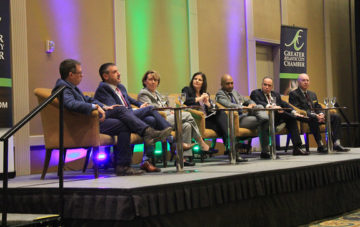
Last Thursday, a meeting room at the Sheraton Atlantic City was jammed to capacity as the AC Chamber hosted an executive panel of Atlantic City casino executives.
Leaders from five properties—Borgata, Tropicana, Resorts, Hard Rock and Ocean—talked with surprising candor about their hopes for the shore resort, and their frustration about the glacial pace of change.
First up were the positives, as the executives talked up respective, ongoing investments in their properties. According to Joe Lupo, president of Hard Rock Atlantic City, that resort—which opened in 2018, following a $500 million overhaul of the former Trump Taj Mahal—has plowed another $20 million into the property to redo suites, add three restaurants, and improve Hard Rock Live; he said to look out for “some other surprises” in 2020.
Ron Baumann, regional president for Caesars Entertainment, said the global operator has spent $300 million since 2016 to add convention space to Harrah’s Atlantic City, is renovating 400 hotel rooms, and brought in the only Gordon Ramsay restaurant on the east coast.
Terry Glebocki, CEO of Ocean Casino Resort, formerly Revel, said the property is “putting our casino first” by investing growth capital on the gaming floor, adding a new high-end slot room and a new Asian room, and making the massive resort tower more easily navigable.
Also in the plus column was the positive impact of sports betting on casino visitation. Marcus Glover, president and chief operating officer for Borgata Hotel Casino & Spa, said, “We figured it would be more of an amenity than a necessary revenue driver,” but added, “It’s great to see the visitation (sports betting) has brought” to the property. Mark Giannantonio, president and CEO of Resorts Casino Hotel, agreed, saying its DraftKings sportsbook “helped to transform our property.’
“Visitation has been incredible,” he said, “and we continue to try to monetize the visitation.”
Steve Callender, senior vice president of operations, East Region for Eldorado Resorts, Inc., which owns the Tropicana, noted that the Boardwalk resort is “seeing a pickup in food and beverage and non-rated table win” as sports betting brings in a “different dynamic, (and) younger people.” Non-gaming attractions will be the key to the city’s ongoing success, he said. “We need to give people the whole package to get them here.”
And Baumann said Caesars’ sportsbook “sold out every single inch of space for the Super Bowl,” attracting “a guest we’ve never seen before.” He agreed that non-gaming amenities are “critical to future of Atlantic City.”
The panel members were outspoken and frankly critical about the city’s ongoing, chronic problems: blocks of abandoned buildings and blighted storefronts, the placement of homeless services and drug treatment facilities right across the street from Boardwalk casinos, and the widespread perception that the city is crime-ridden and unsafe.
Glover said it’s not just perception. “A lot of it is reality,” he said, and added that there is no “silver bullet” that will quickly solve the problem. He urged the city to “separate social responsibility from entertainment and move out some of the blight. You need to get some wins and get some earned media about the positive things happening in Atlantic City.”
“Our buildings can’t be surrounded by drug addicts and prostitutes,” said Hard Rock President Joe Lupo. “The streetlights need to work. There’s a lot of work that needs to be done. The city needs to be in better shape. Go out and buy the biggest bulldozer the county has to offer, and you could probably make a lot of positive changes.”
Their candor was a bracing change and a call to action from companies that have invested collective billions in the city and seen many fixable problems remain unfixed. Callender griped about “three-foot potholes” near the entrance to his casino that have gone unrepaired, and the deplorable condition of Pacific Avenue. “It’s just awful,” he said.
The criticism followed comments last month from Jim Allen, CEO of Hard Rock International, who said Atlantic City “is going in the wrong direction” and is in worse shape than when his company bought the casino three years ago.
“We all agree we’re not pleased with where we are with the Tourism District,” said Giannantonio, speaking of an area encompassing the city’s downtown and casino areas. He said bringing down crime and sprucing up the area could bring in 20 percent to 30 percent more visitors, and do it quickly. Visitors who stay two to three days might stay longer if they felt good about leaving the cocoon of the resort, he added. “I’d like to see them stay four to five days, and venture out to experience a Tourism District that is a sunny place to be, so to speak.”
Lupo questioned spending by the Casino Reinvestment Development Authority, pointing out that, though CRDA has taken in $750 million in revenues derived from gaming since 2011, many critical improvements remain undone in the city. “Where are all these dollars going?” he asked. “There is a lot of blight out there … There needs to be positive change. We haven’t had any in the last five to 10 years.”
Glebocki demanded better maintenance of the city’s beaches and Boardwalk, saying, “That is our Strip. That is our Bourbon Street.”
Each of the executives said the city needs more flights into Atlantic City International Airport, a more stable political situation, and, in a comment from Baumann’s that drew laughter, “summer 12 months a year.”
Finally, asked if efforts by developer Bart Blatstein to revive gaming at the Showboat is a plus or minus, Baumann said, “The Northeast market is saturated; the last thing Atlantic City needs is another casino… It would be purely cannibalistic to do something along those lines.”
“Resorts is totally against an additional casino,” agreed Giannantonio. “It would be a bad move. It will certainly cause cannibalization of the existing properties.”
“The last thing this we need is another slot machine,” said Glover. “‘Tarzan’ at the Borgata is no different from ‘Tarzan’ at the Tropicana.”



